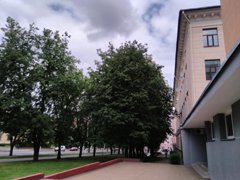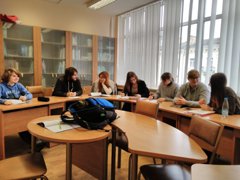Japanese-Language Education at Minsk State Linguistic University
Minsk State Linguistic University
AIHARA Mikiko

The University and the street of embassies
The Japanese-Language Specialists dispatched to Belarus from the Japan Foundation work at two universities. One of these is Minsk State Linguistic University. Japanese-Language Specialists are responsible for four class periods per week. Minsk State Linguistic University is located right next to a metro station, and the embassies of different countries stand on the road in front of the University. You might say that this scenery is typical of a university for the study of foreign languages: when you walk through the gates, you’ll find notice boards in genuine foreign languages.
You can also see scenes typical of a university that specializes in foreign languages, such as students with other linguistic specialties who call out when they see students carrying Japanese-language textbooks to say that they have studied Japanese in the past, or when students who have learned Japanese themselves from books and the Internet visit from other universities. On top of this, I’m sure that the students who have somehow become better at Japanese, even though they specialize in another language, are unique to the Minsk State Linguistic University.
The Belarus Japanese Speech Contest took place in March, and students from the Minsk State Linguistic University participated. Students from the class for which I am responsible participated hopefully, and I was able to see their motivation to learn grow dramatically during the preparatory stages. I watched the students make extremely independent preparations: rather than having their mistakes pointed out and then revising them, the students listened to questions from people who read their speeches and rewrote them to make them more understandable, then listened to further questions and made revisions, and repeated this over and over again. People from the class then listened to the content of the presentations and asked more questions, and the students prepared to answer these in a way that their listeners could understand. Their experiences preparing for the Japanese speech contest seem to have had a positive effect on their later learning.

Exploring something individually and then discussing it with friends.
The class’s cooperation when learning has often been visible—not just before the Japanese speech contest, but at other times too. When reading news together relating to Japan that a student chooses, they don’t just try to understand the Japanese but also work cooperatively to understand both the Japanese and the subject of the news.
Speaking of Japanese speech contests, Japanese students studying Russian in Belarus also give speeches in Russian when the Japanese Speech Contest takes place. Apparently, it’s a good experience to hear speeches in Russian by Japanese people. Minsk State Linguistic University accepts applications for students specializing in the Japanese language once every five years. This academic year was one such year, and I was able to welcome the new students in this specialty. However, there are also a lot of students who minor in Japanese. It's great that the number of Japanese learners is increasing, but when the number of classes for which a single teacher is responsible grows significantly, it becomes a burden. I hope that the teacher numbers would increase with the student numbers.
- What We Do Top
- Arts and Cultural Exchange [Culture]
- Japanese-Language Education Overseas [Language]
- Japanese-Language Education Overseas [Language] Top
- Learn Japanese-language
- Teach Japanese-language
- Take Japanese-Language Test
- Know about Japanese-language education abroad
- The Japanese-Language Institute, Urawa
- The Japanese-Language Institute, Kansai
- Japanese-Language Programs for Foreign Specified Skilled Worker Candidates
- Japanese Language Education for Japanese Children Resident Overseas and for the Descendants of Migrants
- Archives
- Japanese Studies and Global Partnerships [Dialogue]
- JF digital collection
- Other Programs / Programs to Commemorate Exchange Year
- Awards and Prizes
- Publications
